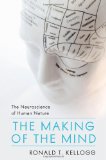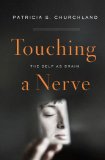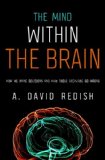July 16, 2013

The Making of the Mind: The Neuroscience of Human Nature by Ronald T. Kellogg (Prometheus Books, 2013)
(kindle ed.), (amazon.co.uk)
Book description from the publisher:
Using the findings of recent neuroscience, a psychologist reveals what sets humans apart from all other species, offering a fascinating exploration of our marvelous and sometimes frightening cognitive abilities and potentials.
According to human genome research, there is a remarkable degree of overlap in the DNA of humans and chimpanzees. So what accounts for the rapid development of human culture throughout history and the extraordinary creative and destructive aspects of human behavior that make us so different from our primate cousins?
Kellogg explores in detail five distinctive parts of human cognition. These are the executive functions of working memory; a social intelligence with “mind-reading” abilities; a capacity for symbolic thought and language; an inner voice that interprets conscious experiences by making causal inferences; and a means for mental time travel to past events and imagined futures.
He argues that it is the interaction of these five components that results in our uniquely human mind. This is especially true for three quintessentially human endeavors-morality, spirituality, and literacy, which can be understood only in light of the whole ensemble’s interactive effects. Kellogg recaps the story of the human mind and speculates on its future. How might the Internet, 24/7 television, and smart phones affect the way the mind functions?
Comments (0)
- cognitive science,mind,new books
July 8, 2013

Experiencing Art: In the Brain of the Beholder by Arthur Shimamura (Oxford University Press, USA, 2013)
(amazon.co.uk)
Book description from the publisher:
How do we appreciate a work of art? Why do we like some artworks but not others? Is there no accounting for taste? Awarded a Guggenheim Fellowship to explore connections between art, mind, and brain, Shimamura considers how we experience art. In a thoughtful and entertaining manner, the book explores how the brain interprets art by engaging our sensations, thoughts, and emotions. It describes interesting findings from psychological and brain sciences as a way to understand our aesthetic response to art.
Beauty, disgust, surprise, anger, sadness, horror, and a myriad of other emotions can occur as we experience art. Some artworks may generate such feelings rather quickly, while others depend on thought and knowledge. Our response to art depends largely on what we know–from everyday knowledge about the world, from our cultural backgrounds, and from personal experience. Filled with artworks from many traditions and time points, “Experiencing Art” offers insightful ways of broadening one’s approach and appreciation of art.
Google Books preview:
See also: Author’s website
Comments (0)
- cognitive science,culture,new books
June 28, 2013

Touching a Nerve: The Self as Brain by Patricia S. Churchland (W.W. Norton & Co., 2013)
(kindle ed.), (amazon.co.uk)
Book description from the publisher:
A trailblazing philosopher’s exploration of the latest brain science—and its ethical and practical implications.
What happens when we accept that everything we feel and think stems not from an immaterial spirit but from electrical and chemical activity in our brains? In this thought-provoking narrative—drawn from professional expertise as well as personal life experiences—trailblazing neurophilosopher Patricia S. Churchland grounds the philosophy of mind in the essential ingredients of biology. She reflects with humor on how she came to harmonize science and philosophy, the mind and the brain, abstract ideals and daily life. Offering lucid explanations of the neural workings that underlie identity, she reveals how the latest research into consciousness, memory, and free will can help us reexamine enduring philosophical, ethical, and spiritual questions: What shapes our personalities? How do we account for near-death experiences? How do we make decisions? And why do we feel empathy for others? Recent scientific discoveries also provide insights into a fascinating range of real-world dilemmas—for example, whether an adolescent can be held responsible for his actions and whether a patient in a coma can be considered a self.
Churchland appreciates that the brain-based understanding of the mind can unnerve even our greatest thinkers. At a conference she attended, a prominent philosopher cried out, “I hate the brain; I hate the brain!” But as Churchland shows, he need not feel this way. Accepting that our brains are the basis of who we are liberates us from the shackles of superstition. It allows us to take ourselves seriously as a product of evolved mechanisms, past experiences, and social influences. And it gives us hope that we can fix some grievous conditions, and when we cannot, we can at least understand them with compassion.
Google Books preview:
Comments (0)
- cognitive science,consciousness,new books,self
June 23, 2013

Future Bright: A Transforming Vision of Human Intelligence by Michael E. Martinez (Oxford University Press, USA, 2013)
(kindle ed.), (amazon.co.uk)
Book description from the publisher:
Ever since Alfred Binet invented the first IQ test more than a century ago, we have thought of intelligence as fixed from birth and unalterable-as genetically programmed and immutable as eye color. If our IQ was 115 at the age of eighteen, it would be 115 at age thirty-two and at age seventy-two. But as Michael Martinez reveals in Future Bright, human intelligence is not at all a static quality. Drawing on cutting-edge research, Martinez shows that not only can we improve our IQ scores–with the right approach, we can improve intelligence itself.
Future Bright introduces the radical view that intelligence can be learned. Ranging from the search for Einstein’s brain to the curious case of a railroad worker whose frontal lobe was pierced by a tamping iron, Martinez looks at some of the most fascinating stories in the history of cognitive science, revealing how researchers have sought insight into intelligence by understanding more about the brain. We see how the physical structures of the brain relate to how we think, discover how memories are made, and examine the several kinds of intelligence. Martinez then explores the astonishing evidence from recent cognitive science that intelligence can be learned. Equally important, he concludes with ten strategies for enhancing our intelligence, beginning with the all-important idea of making improved intelligence a conscious goal, and including such ideas as reading books, learning to be an expert, finding where our talents lie and, not least, eating well and exercising, both of which improve brain function significantly.
Genetics is only one of the factors that shape our intelligence. Future Bright highlights the many ways that the environment and education can increase our brain power, promoting the growth of a more intelligent society–one that will lead us into a brighter future indeed.
Google Books preview:
Comments (0)
- cognitive science,new books
June 21, 2013

The Mind within the Brain: How We Make Decisions and How Those Decisions Go Wrong by A. David Redish (Oxford University Press, USA, 2013)
(kindle ed.), (amazon.co.uk)
Book description from the publisher:
In The Mind within the Brain, David Redish brings together cutting edge research in psychology, robotics, economics, neuroscience, and the new fields of neuroeconomics and computational psychiatry, to offer a unified theory of human decision-making. Most importantly, Redish shows how vulnerabilities, or “failure-modes,” in the decision-making system can lead to serious dysfunctions, such as irrational behavior, addictions, problem gambling, and PTSD.
Told with verve and humor in an easily readable style, Redish makes these difficult concepts understandable. Ranging widely from the surprising roles of emotion, habit, and narrative in decision-making, to the larger philosophical questions of how mind and brain are related, what makes us human, the nature of morality, free will, and the conundrum of robotics and consciousness, The Mind within the Brain offers fresh insight into one of the most complex aspects of human behavior.
Google Books preview:
See also: Author’s website
Comments (0)
- cognitive science,new books







